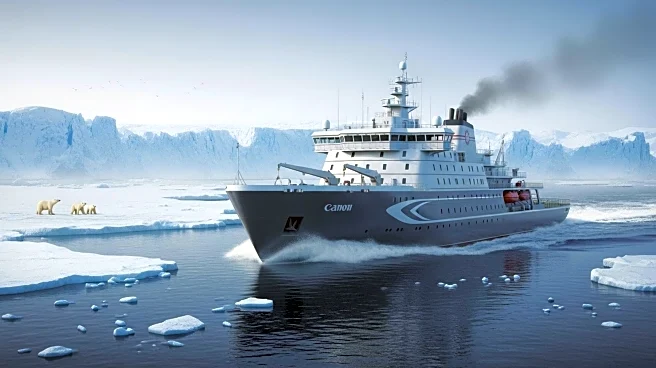What's Happening?
China has initiated a new shipping route through the Arctic Ocean, known as the Northern Sea Route, as part of its 'Polar Silk Road' initiative. This development is made possible by the rapid melting of Arctic ice due to climate change, which is warming the region at four times the global average rate. The route, which is currently navigable only during the summer and fall, offers a shorter path from China to Europe compared to the traditional Suez Canal route. The container ship Istanbul Bridge is currently making this journey, marking the official opening of the China-Europe Arctic Express container route. This move is seen as a strategic effort by China to capitalize on the economic and geopolitical opportunities presented by an increasingly ice-free Arctic.
Why It's Important?
The opening of the Northern Sea Route represents a significant shift in global trade dynamics, potentially reducing travel time and costs for shipping between Asia and Europe. This could reorient trade routes and provide China with a strategic advantage in Arctic navigation, further establishing it as a key player in the region. However, the environmental risks are substantial, as increased shipping traffic could lead to ecological disasters in the fragile Arctic ecosystem. The use of heavy fuel oil by ships poses additional threats, including oil spills and accelerated ice melt due to black carbon emissions. The route's development also raises geopolitical concerns, as it involves navigating waters controlled by Russia, adding complexity to international relations.
What's Next?
The future of the Northern Sea Route depends on various factors, including economic viability, environmental safety, and geopolitical stability. If successful, China could gain significant operational expertise in polar navigation, enhancing its influence in the Arctic. However, any major environmental incident or geopolitical tension could render the route politically and economically untenable. Western shipping companies have largely avoided the route due to these risks, leaving China with a potential strategic advantage. The global shipping industry will be closely monitoring the route's development, weighing the benefits against the potential hazards.
Beyond the Headlines
The development of the Northern Sea Route highlights the broader implications of climate change on global trade and geopolitics. As Arctic ice continues to melt, new opportunities and challenges will arise, reshaping international relations and economic strategies. The ethical considerations of exploiting a fragile ecosystem for economic gain are significant, raising questions about the responsibility of nations to protect the environment while pursuing economic interests. The situation underscores the urgent need for international cooperation and regulation to ensure sustainable and safe navigation in the Arctic.










